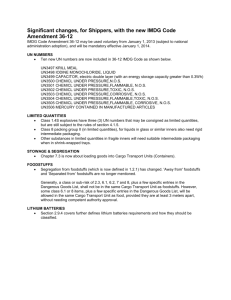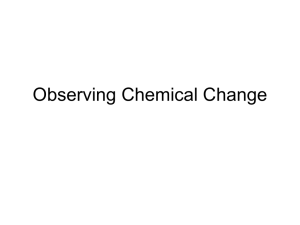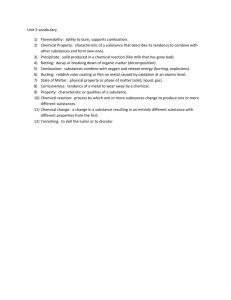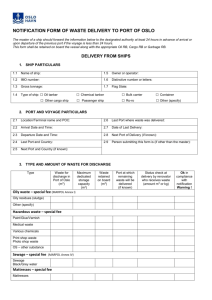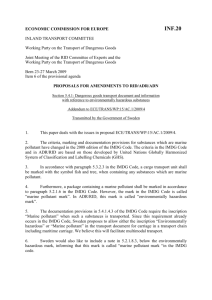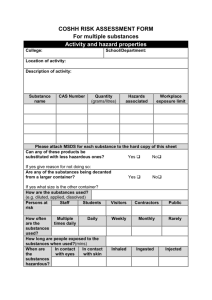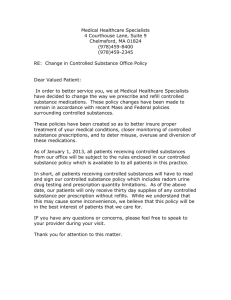Code lists per member state Locations
advertisement
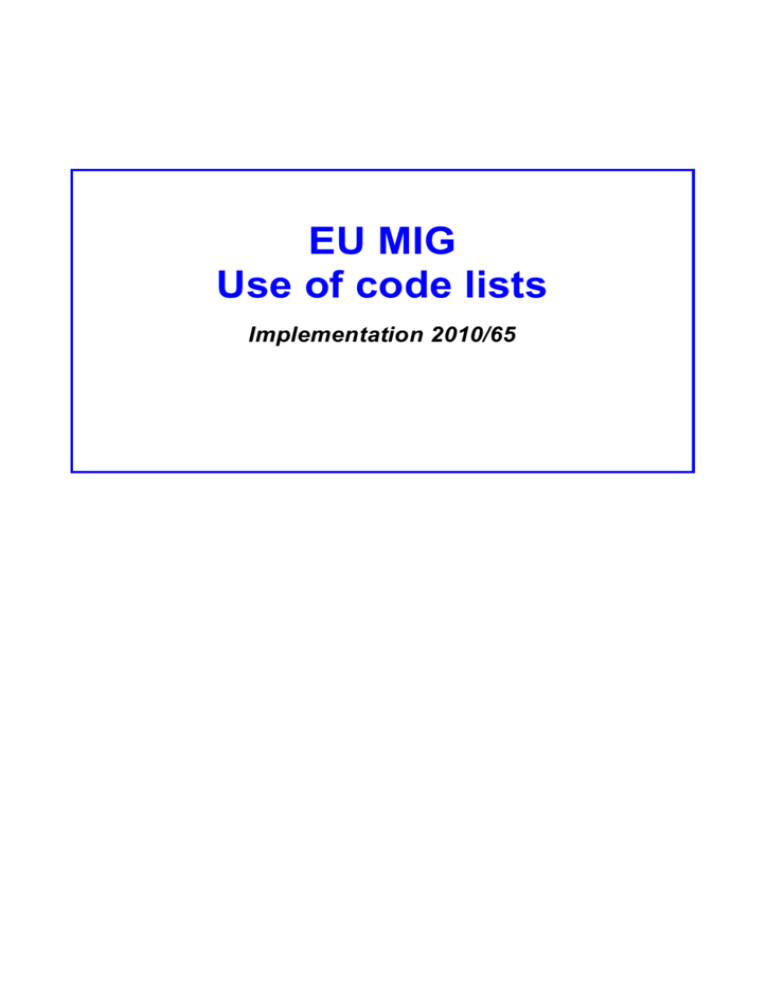
a. EU MIG Use of code lists Implementation 2010/65 Versie 0.1 Content 1. INTRODUCTION ................................................................................. 4 2. CODE LISTS PER MEMBER STATE .................................................. 5 2.1 Locations ................................................................................................ 5 2.1.1 2.1.2 2.2 Organisations ......................................................................................... 5 2.2.1 2.2.2 2.2.3 3. 3.1 Locations ................................................................................................ 6 Codes for Packaging Types ...................................................................................... 10 Codes for Goods Classification Type ........................................................................ 10 Codes for Transport Document Type ........................................................................ 15 Transport Charges Method of Payment ..................................................................... 15 Goods Status Code .................................................................................................. 16 Full/Empty Code ...................................................................................................... 16 Handling Instruction Code ........................................................................................ 16 Stores ................................................................................................... 16 3.4.1 3.5 Codes for Ship Type................................................................................................... 7 Code for Ship Identification Type ................................................................................ 7 Code for INF Ship Class ............................................................................................. 8 Codes for Characteristic of Ship ................................................................................. 8 Codes for Security Level ............................................................................................ 9 Codes for Call Purpose .............................................................................................. 9 Codes for Ship-to-Ship Activity ................................................................................... 9 Cargo ................................................................................................... 10 3.3.1 3.3.2 3.3.3 3.3.4 3.3.5 3.3.6 3.3.7 3.4 Codes for countries .................................................................................................... 6 Codes for ports/places ............................................................................................... 6 Codes for Port Function.............................................................................................. 7 Vessel .................................................................................................... 7 3.2.1 3.2.2 3.2.3 3.2.4 3.2.5 3.2.6 3.2.7 3.3 Codes for EORI .......................................................................................................... 5 Codes for Reporting Party .......................................................................................... 5 Codes for Dispatching Organisation ............................................................................ 5 CODE LISTS FOR ALL MEMBER STATES........................................ 6 3.1.1 3.1.2 3.1.3 3.2 Codes for National Ports ............................................................................................ 5 Codes for Location In Port .......................................................................................... 5 Codes for Store Types ............................................................................................. 16 Waste ................................................................................................... 17 3.5.1 Codes for Waste Type .............................................................................................. 17 Page 2 of 23 3.5.2 3.6 Persons ................................................................................................ 18 3.6.1 3.6.2 3.6.3 3.7 Codes for Declaration Types .................................................................................... 21 Codes for Status Indicator ........................................................................................ 21 Codes for Response Status ...................................................................................... 22 Additional Information ........................................................................... 22 3.10.1 3.11 Codes for Party Role ................................................................................................ 20 Codes for Communication Type ................................................................................ 20 Messages ............................................................................................. 21 3.9.1 3.9.2 3.9.3 3.10 Codes for Document Type ........................................................................................ 19 Codes for Document Status ...................................................................................... 19 Codes for Travel Document Type ............................................................................. 20 Organisations ....................................................................................... 20 3.8.1 3.8.2 3.9 Codes for Person Type ............................................................................................. 18 Codes for RankOrRating .......................................................................................... 19 Codes for Gender..................................................................................................... 19 Documents ........................................................................................... 19 3.7.1 3.7.2 3.7.3 3.8 Codes for Goods Measure Type ............................................................................... 18 Codes for Additional Information Type ...................................................................... 22 Miscellaneous ....................................................................................... 23 3.11.1 3.11.2 3.11.3 Codes for Quantity Unit ............................................................................................ 23 Codes for Weight Unit .............................................................................................. 23 Codes for Yes_No .................................................................................................... 23 Page 3 of 23 1. Introduction The EU MIG is based on the B2MSW message. The B2MSW defines multiple declarations which can be used by the maritime industry to fulfil reporting formalities for vessels calling an EU port. The B2MSW message definition 1 contains: Structure of message by making uses of classes and data elements based upon the structure of the WCO Data Model Definition of number of occurrences for classes and data elements Validation rules for B2MSW; these rules are related to: a) C-rules: Conditions b) V-rules: Possible values c) R-rules: Rules (possibly across classes and data elements) These definition components need to be the same across the EU member states, otherwise the maritime industry has to implement a different electronic message interface per member state. This document focuses on the rules related to possible value. The objective of this document is to come to a harmonised set of code lists which are used in the validation rules. The WCO Data Model has defined which code list must be used for data elements. There are two options: - EDIFACT code list - User code list For harmonisation of code lists it is important to make a distinction between the code lists for which the codes can be determined per member state, and the code lists which have to be harmonised since the codes are used for all member states. 1 Document: MSW - 05a1 Global Design - Message Definition - B2MSW v095 Page 4 of 23 2. Code lists per member state 2.1 Locations 2.1.1 Codes for National Ports Code list is based on UN/Locodes. Each member state needs to define which location codes can be used for the ports of call in the member state. 2.1.2 Codes for Location In Port Code list contains the possible positions in the ports that are contained in the ‘Codes for National Ports’. This code list needs to be defined per member state. 2.2 Organisations 2.2.1 Codes for EORI Code list is based on EORI codes in European database. Each member state needs to define themselves how to use this list of codes (local copy or otherwise). 2.2.2 Codes for Reporting Party Declarations are reported by reporting parties. These parties need to be known based upon their EORI number. This code table contains the EORI numbers of reporting parties which are allowed to report to the MSW of the particular Member State. 2.2.3 Codes for Dispatching Organisation Messages are sent by dispatching organisation. A dispatching organisation might be the same as the reporting party. However, a dispatching organisation can send messages for multiple reporting parties. An example of the latter is the organisation which exploits a Port Community System which is used by multiple agents (reporting parties). Page 5 of 23 3. Code lists for all member states 3.1 Locations 3.1.1 Codes for countries The country code is used for several data elements: countries, nationality of persons and flag state of vessel. Code list is based on EDIFACT 3207 (ISO 3166-1) and on ISO 3166-3. Each code contains the indication whether the code is included in ISO 3166-1 (indication = 1) or ISO 3166-3 (indication = 3). Examples2 Country code in message ISO-31663 Text label of code AD 1 ANDORRA AE 1 UNITED ARAB EMIRATES AF 1 AFGHANISTAN 3 NETHERLANDS ANTILLES … AN … 3.1.2 Codes for ports/places The content of the code table with the location codes is based upon the files of the UN/ECE. These files are maintained and published by the UN/ECE on a regular basis. The following types of files are published: mdb, csv, txt and pdf. The location files can be downloaded from the website of the UN/ECE (http://www.unece.org/cefact/locode). The manuals which belong to the specific type of file contain the description of the columns. Examples Code in message Text label for place 4 AEABU ABU AL BUKHOOSH AEAJM AJMAN AEAMF MUSSAFAH 2 Colour of header row is yellow if table contains examples. Header row is blue if the table contains all possible values. 3 Indication in which ISO 3166 4 First two characters of country can be found in Country Code. Page 6 of 23 Text label for place 4 Code in message … 3.1.3 Codes for Port Function This code list is based on EDIFACT 3227. A limited set of codes can be used in B2MSW. All possible codes are: Code in message (length = an..3) Text label of code 9 Port of loading 11 Port of discharge 61 Next port of call 125 Last port of call 153 Port of call < DMR > Waste delivery port 3.2 Vessel 3.2.1 Codes for Ship Type Code list is based on EDIFACT 8179 (UN/ECE recommendation 28, Annex 2); see document “Recommendation 28 (ship types)”. Only a limited set of codes is included in this document as an example. Examples Code in message Text label of code 50 General cargo vessel 501 Grain vessel 502 Timber/log carrier … 51 Unit carrier 511 Full container ship/cellular vessel 512 RoRo vessel … 3.2.2 Code for Ship Identification Type All possible codes are: Code in message Text label of code IMO IMO Number MMSI MMSI Number CSI Call sign EXT External sign Page 7 of 23 Code in message Text label of code ENI ENI Number 3.2.3 Code for INF Ship Class All possible codes are: Code in message Text label of code Remarks INF1 Class INF 1 ship Ships which are certified to carry materials with an aggregate radioactivity less than 4,000 TBq 5 INF2 Class INF 2 ship Ships which are certified to carry irradiated nuclear fuel or high-level radioactive wastes with an aggregate radioactivity less than 2 x 10 6 Tbq and ships which are certified to carry plutonium with an aggregate radioactivity less than 2 x 10 5 TBq INF3 Class INF 3 ship Ships which are certified to carry irradiated nuclear fuel or high-level radioactive wastes, and ships which are certified to carry plutonium with no restriction on the aggregate radioactivity of the materials. 3.2.4 Codes for Characteristic of Ship The B2MSW contains the option to report characteristics of the vessel. This can be done by using two data elements: - Type - Value For both data elements predefined codes need to be used. All possible codes for type of characteristic: Code in message (length = an..17) Text label of code 1 Hull type 2 Construction type of ballast tanks All possible codes for values in case characteristics are related to Type = “1” (Hull type): Code in message (length = an..3) Text label of code 1 Single hull 2 Double hull All possible codes for values in case characteristics are related to Type = “2” (Construction type of ballast tanks): Code in message (length = an..3) 5 Text label of code TBq = Tera-becquerels Page 8 of 23 Code in message (length = an..3) Text label of code 1 Segregated ballast tanks 2 Non-segregated ballast tanks 3.2.5 Codes for Security Level All possible codes are: Code in message (length = an..3) Text label of code SL1 Security level 1 SL2 Security level 2 SL3 Security level 3 3.2.6 Codes for Call Purpose This code list is based on EDIFACT 8025. A limited set of codes can be used in B2MSW. All possible codes are: Code in message (length = an..3) Text label of code 1 Cargo operations 2 Passenger movement 3 Taking bunkers 4 Changing crew 5 Goodwill visit 6 Taking supplies 7 Repair 8 Laid-up 9 Awaiting orders 10 Miscellaneous 11 Crew movement 12 Cruise, leisure and recreation 13 Under government order 14 Quarantine inspection 15 Refuge 16 Unloading cargo 17 Loading cargo 18 Repair in dry dock 19 Repair in wet dock 20 Cargo tank cleaning 21 Means of transport customs clearance 22 De-gassing 23 Waste disposal < DMR > Pass through 3.2.7 Codes for Ship-to-Ship Activity This code list is based on EDIFACT 8025. A limited set of codes can be used in B2MSW. All possible codes are: Page 9 of 23 Code in message (length = an..3) Text label of code 2 Passenger movement 3 Taking bunkers 4 Changing crew 6 Taking supplies 7 Repair 11 Crew movement 14 Quarantine inspection 16 Unloading cargo 17 Loading cargo 20 Cargo tank cleaning 22 De-gassing 23 Waste disposal 3.3 Cargo 3.3.1 Codes for Packaging Types Code list is based on EDIFACT 7065, which is based on UN/ECE Recommendation 21, Annex V, alphabetical code. Only a limited set of codes is included in this document as an example. Examples Code in message Text label of code AE Aerosol AM Ampoule, non-protected AP Ampoule, protected … 3.3.2 Codes for Goods Classification Type The B2MSW contains the option to report classifications of the cargoes. This can be done by using two data elements: - Type - Value For both data elements predefined codes need to be used. All possible codes for type of classification: Code in message (Length = an..3) Text label of code HS HS Code < DMR > UN Number SSM IMO Code < DMR > IMO Hazard Class Page 10 of 23 Code in message (Length = an..3) Text label of code < DMR > Subsidiairy Risk < DMR > MARPOL Code IBC < DMR > Packing Group < DMR > EmS Spillage Code < DMR > EmS Fire Code < DMR > Store Type < DMR > Waste Type A limited set of possible codes for values in case classifications are related to Type = “HS” (HS Code): Examples Code in message (length = an..18) Text label of code 100000000 LIVE ANIMALS 101000000 LIVE HORSE, ASSES, MULE, HINNY 102000000 LIVE BOVINE ANIMAL, COWS 103000000 LIVE SWINE 104000000 LIVE GOAT, SHEEP … All possible codes for values in case classifications are related to Type = “SSM” (IMO Code): Code in message (length = an..18) Text label of code IMDG IMDG IBC IBC IGC IGC IMSBC IMSBC MARPOL_ANNEX1 MARPOL ANNEX 1 All possible codes for values in case classifications are related to Type = “…< DMR …” (IMO Hazard Class): Code in message (length = an..18) Text label for code Applicable for 1 Explosives IMDG 1.1 Substances and articles which have a mass explosion IMDG IMDG IMDG IMO Code hazard 1.2 Substances and articles which have a projection hazard but not a mass explosion hazard 1.3 Substances and articles which have a fire hazard and either a minor blast hazard or a minor projection hazard or both, but not a mass explosion hazard Page 11 of 23 Code in message (length = an..18) Text label for code 1.4 Substances and articles which present no significant Applicable for IMO Code IMDG IMDG IMDG hazard 1.5 Very insensitive substances which have a mass explosion hazard 1.6 Extremely insensitive articles which do not have a mass explosion hazard 2 Gases IMDG 2.1 Flammable gases IMDG IGC 2.2 Non-flammable, non-toxic gases IMDG IGC IMDG IGC 2.3 Toxic gases 3 Flammable liquids IMDG 4 Flammable solids; substances liable to spontaneous IMDG Flammable solids, self-reactive substances and IMDG desensitized explosives IMSBC Substances liable to spontaneous combustion IMDG IMSBC Substances which, in contact with water, emit IMDG flammable gases IMSBC 5 Oxidizing substances and organic peroxides IMDG 5.1 Oxidizing substances IMDG IMSBC combustion; substances which, in contact with water, emit flammable gases 4.1 4.2 4.3 5.2 Organic peroxides IMDG 6 Toxic and infectious substances IMDG 6.1 Toxic substances IMDG IMSBC 6.2 Infectious substances IMDG 7 Radioactive material IMDG IMSBC IMDG IMSBC IMDG 8 Corrosive substances 9 Miscellaneous dangerous substances and articles IMSBC MHB Material hazardous only in bulk IMSBC S Product is included in the code because of its safety IBC IBC IBC MARPOL_A hazards S/P Product is included in the code because of its safety and pollution hazards P Product is included in the code because of its pollution hazards HEAVY Heavy grade oil Page 12 of 23 Code in message (length = an..18) Text label for code Applicable for IMO Code NNEX1 LIGHT Light grade oil UNKNOWN Code is not known IMDG MARPOL_A MARPOL_A NNEX1 NNEX1 All possible codes for values in case classifications are related to Type = “…< DMR …” (MARPOL IBC Code): Code in message (length = an..18) Text label of code X Noxious Liquid Substances which, if discharged into the sea from tank cleaning or deballasting operations, are deemed to present a major hazard to either marine resources or human health and, therefore, justify the prohibition of the discharge into the marine environment Y Noxious Liquid Substances which, if discharged into the sea from tank cleaning or deballasting operations, are deemed to present a hazard to either marine resources or human health or cause harm to amenities or other legitimate uses of the sea and therefore justify a limitation on the quality and quantity of the discharge into the marine environment Z Noxious Liquid Substances which, if discharged into the sea from tank cleaning or deballasting operations, are deemed to present a minor hazard to either marine resources or human health and therefore justify less stringent restrictions on the quality and quantity of the discharge into the marine environment OS Other substances which have been evaluated and found to fall outside Category X, Y or Z because they are considered to present no harm to marine resources, human health, amenities or other legitimate uses of the sea when discharged into the sea from tank cleaning of deballasting operations UNKNOWN UNKNOWN All possible codes for values in case classifications are related to Type = “…< DMR …” (Packing Group): Code in message (length = an..18) Text label of code I Packing group I II Packing group II III Packing group III NONE NONE Page 13 of 23 All possible codes for values in case classifications are related to Type = “…< DMR …” (EmS Spillage Code): Code in message Text label of code (Length = an..18) S-A Toxic substances S-B Corrosive substances S-C Flammable, corrosive liquids S-D Flammable liquids S-E Flammable liquids floating on water S-F Water soluble marine pollutants S-G Flammable solids and self-reactive substances S-H Flammable solids, molten material) S-I Flammable solids, repacking possible S-J Wetted explosives and certain self-heating substance S-K Temperature-controled self-reactive substances S-L Spontaneously combustible, water-reactive material S-M Hazard of spontaneous ignition S-N Substances reacting vigorously with water S-O Substances dangerous when wet, non-collectable articles S-P Substances dangerous when wet, collectable articles S-Q Oxidizing substances S-R Organic peroxides S-S Radioactive material S-T Dangerous goods with biohazard S-U Gases, flammable toxic or corrosive S-V Gases, non-flammable non-toxic S-W Oxidizing gases S-X Explosive items and articles S-Y Explosive chemicals S-Z Toxic explosives All possible codes for values in case classifications are related to Type = “…< DMR …” (EmS Fire Code): Code in message Text label of code (Length = an..18) F-A General fire schedule F-B Explosive substances and articles F-C Non-flammable gasses F-D Flammable gases F-E Non water reactive flammable liquids F-F Temperature controlled self-reatives and organic peroxides F-G Water reactive substances Page 14 of 23 Code in message Text label of code (Length = an..18) F-H Oxidizing substances with explosive potential F-I Radioactive material F-J Non-temperature controlled self-reactives and organic peroxides A limited set of possible codes for values (as published by the United Nations Committee of Experts on the Transport of Dangerous Goods) in case classifications are related to Type = “… < DMR> …” (UN Number): Examples Code in message (length = an..18) Text label of code 0004 Ammonium picrate, dry or wetted with less than 10 percent water, by mas 0005 Cartridges for weapons, with bursting charge 0006 Cartridges for weapons, with bursting charge 0007 Cartridges for weapons, with bursting charge 0009 Ammunition, incendiary with or without burster, expelling charge, or propelling charge … 3.3.3 Codes for Transport Document Type This code list is based on EDIFACT 1001. A limited set of codes can be used in B2MSW. All possible codes are: Code in message (length = an..3) Text label of code 703 House B/L 705 Master B/L 3.3.4 Transport Charges Method of Payment This code list is based on a code list of Dutch Customs. All possible codes are: Code in message (length = an..3) Text label of code A Cash payment B Credit card payment C Cheque payment D Other, f.i. automatic depreciation, fund account H Electronic payment Y Account holber by carrier Z Not prepaid Page 15 of 23 3.3.5 Goods Status Code This code list is based on a code list of Dutch Customs. All possible codes are: Code in message Text label of code (Length = an..3) C Goods moving under internal community transit procedure T Mixed consignment of T1 or T2 goods T1 Non community goods T2 Community goods T2M ART 325 TVO; Fishery products 3.3.6 Full/Empty Code This code list is based on EDIFACT 8169. A limited set of codes can be used in B2MSW. All possible codes are: Code in message Text label of code (Length = an..3) 4 Empty 5 Full 3.3.7 Handling Instruction Code This code list is based on … (unclear yet; EDIFACT 4079 or code list of Dutch Customs). All possible codes are: Code in message (length = an..3) Text label of code 3.4 Stores 3.4.1 Codes for Store Types This code list is based on list of Dutch Customs. All possible codes are: Code in message (length = an..18) Unit Remarks 001 LTR Alcoholic spirits 002 LTR Other alcoholic goods 003 LTR Wine 004 NR Cigarettes 005 NR Cigars 006 KG Tobacco Page 16 of 23 Code in message (length = an..18) Unit Remarks 007 LTR Fuels 008 LTR Lubricants 009 KG Drugs 010 KG Flesh and flesh products 011 NR Fire arms 012 NR Ammunition 099 NR Miscellaneous 3.5 Waste 3.5.1 Codes for Waste Type This code list is based on list of EMSA for codes of waste typoes. All possible codes are: Code in message Other identicator Remarks 1100 N Waste oils – Sludge 1200 N Waste oils - Bilge water 1300 Y Waste oils - Other 1301 N Waste oils - Other - Used engine oil 2100 N Garbage - Food waste 2200 N Garbage - Plastic 2300 Y Garbage - Other 2301 N Garbage - Other - International catering waste 2302 N Garbage - Other - Paper products 2303 N Garbage - Other - Rags 2304 N Garbage - Other - Glass 2305 N Garbage - Other - Metal 2306 N Garbage - Other - Bottles 2307 N Garbage - Other - Crockery 2308 N Garbage - Other - Incinerator ashes and clinkers 2309 N Garbage - Other - Animal carcasses 2310 N Garbage - Other - Special items (e.g. medical waste, oily (Length = ?) rags, paint, cans, dated pyrotechnics, batteries, print cartridges, etc.) 2311 N Garbage - Other - Cooking oil 2312 N Garbage - Other - Deck and external surfaces wash water containing cleaning agents or additives harmful to the marine environment 3000 N Sewage 4000 N Cargo associated waste 4100 Y Cargo associated waste - Marpol Annex V - Other 4101 N Cargo associated waste - Marpol Annex V - Dunnage, lining 5000 N or packing material Cargo residues Page 17 of 23 Code in message Other identicator Remarks 5100 Y Cargo residues - Marpol Annex I - Other 5101 N Cargo residues - Marpol Annex I - Oily tank washings 5102 N Cargo residues - Marpol Annex I - Oily (dirty) ballast water 5103 N Cargo residues - Marpol Annex I - Scale and sludge from 5200 Y Cargo residues - Marpol Annex II - Other 5201 N Cargo residues - Marpol Annex II - Washing waters 5202 N (Length = ?) tank cleaning containing noxious cargo residues Cargo residues - Marpol Annex II - Ballast water containing noxious cargo residues 5300 Y Cargo residues - Marpol Annex V - Other 5301 N Cargo residues - Marpol Annex V - Cargo hold washing water containing residues and or cleaning agents or additives harmful to the marine environment 5302 N Cargo residues - Marpol Annex V - Cargo hold washing water containing residues and or cleaning agents or additives NOT harmful to the marine environment 5303 N 5304 N Cargo residues - Marpol Annex V - Dry cargo residues harmful to the marine environment Cargo residues - Marpol Annex V - Dry cargo residues NOT harmful to the marine environment 3.5.2 Codes for Goods Measure Type In WAS declaration each waste item contains various volumes. These volumes are defined as GoodsMeasure in the B2MSW. There is no existing list which can be used. All possible codes are: Code in message (length = ?) Text label … To be delivered … Max storage … Retained onboard … Estimate generated 3.6 Persons 3.6.1 Codes for Person Type This code list is based on EDIFACT 3035. A limited set of codes can be used in B2MSW. All possible codes are: Code in message (length = an..3) Text label of code FM Crew FL Passenger Page 18 of 23 Code in message (length = an..3) Text label of code DEE Stowaway 3.6.2 Codes for RankOrRating There is no list yet for these codes. Code in message (length = an..70) Text label of code < To Do> 3.6.3 Codes for Gender All possible codes are: Code in message (length = an..3) Text label of code F Female M Male X Unknown 3.7 Documents 3.7.1 Codes for Document Type This code list is based on EDIFACT 1001. A limited set of codes can be used in B2MSW. All possible codes are: Code in message Text label of (Length = an..3) code Remarks 536 ISSC International Ship Security Certificate 537 Interim ISSC Interim International Ship Security Certificate 552 SSP ISPS Ship Security Plan 797 MDH Maritime Declaration of Health 798 COR Certificate of Registry Sanitary certificate; is used for Ship’s Sanitary Control 852 Certificate < DMR > MRN Movement reference number which reference to previous (ENS) declaration 3.7.2 Codes for Document Status The status of document is used for certificates and Ship Security Plans. All possible codes are: Code in message (length = an..3) Text label of code Remarks VAL VALID Valid certificate INV INVALID Invalid certificate APP APPROVED Approved SSP Page 19 of 23 Code in message (length = an..3) Text label of code Remarks NAP NOT-APPROVED Not approved SSP 3.7.3 Codes for Travel Document Type This code list is based on EDIFACT 1001. A limited set of codes can be used in B2MSW. All possible codes are: Code in message (length = an..3) Text label of code 36 Identity card 39 Passport 101 Registration document 483 Visa < DMR > Seaman’s book < DMR > Residence permit 3.8 Organisations 3.8.1 Codes for Party Role This code list is based on EDIFACT 3035. A limited set of codes can be used in B2MSW. All possible codes are: Code in message Text label of code Remarks (Length = an..3) CA Carrier AG Agent NI Notify party DT Reporting party < DMR > Port authority CPE Master VQ GVT Contracting Government; used for issuing party for ISSC (VQ = Responsible government agency) < DMR > RO Recognised Organisation; used for issuing party for ISSC DFQ RSO Recognised Security Organisation; used for issuing party for ISSC (DFQ = Security certificate issuer, recognized) 3.8.2 Codes for Communication Type This code list is based on EDIFACT 3155. A limited set of codes can be used in B2MSW. All possible codes are: Code in message (length = an..3) Text label of code AV Inmarsat AW Call sign Page 20 of 23 Code in message (length = an..3) Text label of code EM Email FX Telefax TE Telephone < DMR > MMSI 3.9 Messages 3.9.1 Codes for Declaration Types The MSW is based on processing declarations. The MSW processes a predefined set of types of declarations. In the B2MSW other types of declaration may be included which are not processed by the MSW but which are ignored (e.g. effects). Code in message (length = Text label of code Processed by MSW6 an..3) MAI Main Y NOA Notice of arrival Y/N COA Cancellation of arrival Y/N EFF Crew’s effects Y/N ETA Expected datetime of arrival Y/N ATA Actual datetime of arrival Y/N NOD Notice of departure Y/N ETD Expected datetime of departure Y/N ATD Actual datetime of departure Y/N EXP Notification of expanded inspection Y/N SEC Notification of security information Y/N WAS Declaration of ship generated waste and cargo residues Y/N PAX Notification of persons on board Y/N MDH Maritime declaration of health Y/N STO Declaration of ship’s stores Y/N ENS Entry summary declaration Y/N SDT Summary declaration of temporary storage Y/N HZA Notification of hazardous and polluting materials on board at Y/N arrival HZD Notification of hazardous and polluting materials on board at Y/N departure REF Reference data of vessel Y/N 3.9.2 Codes for Status Indicator 6 It is up to each member state which types of declarations are supported. Page 21 of 23 This code list is based on EDIFACT 1225. A limited set of codes can be used in B2MSW. All possible codes are: Code in message (length = an..2) Text label of code 4 Change 9 Original 3.9.3 Codes for Response Status These response status are used in the response messages (MSW2B-RESP). This code list is based on EDIFACT 1225. A limited set of codes can be used in B2MSW. All possible codes are: Code in message (length = n..2) Text label of code 27 Not accepted 44 Accepted 45 Partly accepted 3.10 Additional Information 3.10.1 Codes for Additional Information Type The B2MSW contains the option to report additional information. This can be done by using two data elements: - Type - Value For both data elements predefined codes need to be used. The code list for Type is based on EDIFACT 4451. A limited set of codes can be used in B2MSW. All possible codes for type are: Code in message (length =- an..3) Text label of code AAI General information AAY Certification statements BLT Security information ICN Special mentions CUS Special circumstances < DMR > Visited affected area < DMR > Any person died < DMR > More Ill passengers than normal Values are based on EDIFACT 4451. All possible codes for values in case Type = “ICN” (Special mentions): Code in message (length = an..17) Text label of code < DMR > 10600 Page 22 of 23 All possible codes for values in case Type = “CUS” (Special circumstances): Code in message (length = an..17) Text label of code < DMR > A=AEO < DMR > E=Post/express consignments 3.11 Miscellaneous 3.11.1 Codes for Quantity Unit All possible values are: Code in message (length = 6) Text label of code CBM Cubic metres LTR Litres NR Number 3.11.2 Codes for Weight Unit All possible values are: Code in message (length = 6) Text label of code KG Kilograms TNE Tons 3.11.3 Codes for Yes_No All possible values are: Code in message (length = an..3) Text label of code 0 No 1 Yes Page 23 of 23
